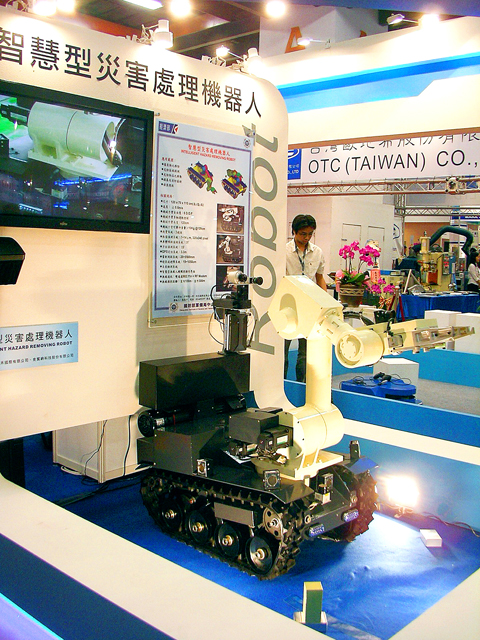The first Taipei International Robot Exhibition (Robot Taiwan), which opened yesterday, showcases the nation��s advances in artificial intelligence (AI) technology and mechanics, the Taiwan External Trade Development Council (TAITRA) said.
The Robot Taiwan show, which is being held alongside the Taipei CNC Machine Tool & Manufacturing Technology Show (MT Duo) at the Taipei World Trade Center Exhibition Hall 1 through Monday, is expected to attract 11,000 visitors and buyers, including about 1,000 from overseas, TAITRA said.
The joint exhibition features 940 booths occupied by 219 local manufacturers and 70 international representatives of companies, mainly from the US, Japan and Europe.

PHOTO: TSENG HUI-WEN, TAIPEI TIMES
��Robots will soon be closely integrated with every kind of artificial intelligence, and this will be one of Taiwan��s priority industries in the future,�� TAITRA CEO and president Chao Yuen-chuan (���å�) said at the opening ceremony.
Chao said the government aims to gain 6 percent, or NT$250 billion (US$8.2 billion), of the fast-expanding robotics market by 2015.
��To this end, TAITRA decided to launch the robot show as an independent event to display the latest innovations in industrial robots and mechanical arms, service robots and many other specialized AI gadgets,�� Chao said.
Innovations in robotics were previously displayed as part of the MT Duo exhibition.
Taiwan accounted for 5.56 percent of the global robot market, with production value reaching NT$20 billion last year.
With major companies such as Mitsubishi Corp (Taiwan), Cherng Yu Machinery and Switzerland��s Staubli joining the exhibition, Chen said that TAITRA has invited large international buyers, including the Osaka Machine Tools Distributors�� Association from Japan, to attend the show.
The exhibition also includes a robot forum today on the future development of AI technology and will focus on the robotics industry in Taiwan and Japan.
��The forum will allow Taiwanese makers to gain greater knowledge of how to generate more business opportunities through international cooperation,�� Chao said.

Shiina Ito has had fewer Chinese customers at her Tokyo jewelry shop since Beijing issued a travel warning in the wake of a diplomatic spat, but she said she was not concerned. A souring of Tokyo-Beijing relations this month, following remarks by Japanese Prime Minister Sanae Takaichi about Taiwan, has fueled concerns about the impact on the ritzy boutiques, noodle joints and hotels where holidaymakers spend their cash. However, businesses in Tokyo largely shrugged off any anxiety. “Since there are fewer Chinese customers, it’s become a bit easier for Japanese shoppers to visit, so our sales haven’t really dropped,” Ito

The number of Taiwanese working in the US rose to a record high of 137,000 last year, driven largely by Taiwan Semiconductor Manufacturing Co’s (TSMC, 台積電) rapid overseas expansion, according to government data released yesterday. A total of 666,000 Taiwanese nationals were employed abroad last year, an increase of 45,000 from 2023 and the highest level since the COVID-19 pandemic, data from the Directorate-General of Budget, Accounting and Statistics (DGBAS) showed. Overseas employment had steadily increased between 2009 and 2019, peaking at 739,000, before plunging to 319,000 in 2021 amid US-China trade tensions, global supply chain shifts, reshoring by Taiwanese companies and

Taiwan Semiconductor Manufacturing Co (TSMC) Chairman C.C. Wei (魏哲家) and the company’s former chairman, Mark Liu (劉德音), both received the Robert N. Noyce Award -- the semiconductor industry’s highest honor -- in San Jose, California, on Thursday (local time). Speaking at the award event, Liu, who retired last year, expressed gratitude to his wife, his dissertation advisor at the University of California, Berkeley, his supervisors at AT&T Bell Laboratories -- where he worked on optical fiber communication systems before joining TSMC, TSMC partners, and industry colleagues. Liu said that working alongside TSMC

TECHNOLOGY DAY: The Taiwanese firm is also setting up a joint venture with Alphabet Inc on robots and plans to establish a firm in Japan to produce Model A EVs Manufacturing giant Hon Hai Precision Industry Co (鴻海精密) yesterday announced a collaboration with ChatGPT developer OpenAI to build next-generation artificial intelligence (AI) infrastructure and strengthen its local supply chain in the US to accelerate the deployment of advanced AI systems. Building such an infrastructure in the US is crucial for strengthening local supply chains and supporting the US in maintaining its leading position in the AI domain, Hon Hai said in a statement. Through the collaboration, OpenAI would share its insights into emerging hardware needs in the AI industry with Hon Hai to support the company’s design and development work, as well